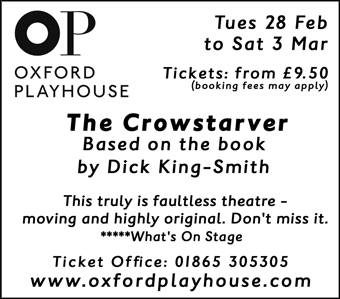Crowstarver, currently showing at the Oxford Playhouse, is adapted from the Dick King-Smith novel of the same name. Set in a rural community at the beginning of the Second World War, it is a more grown-up story than many of King-Smith’s novels, and is recommended for an audience of 8 years or older.
Crowstarver tells the story of John “Spider” Sparrow, a foundling abandoned in a field during the lambing season. Spider is rescued by Tom, the shepherd; there is a funny scene very early on in the play, when Tom, who minutes earlier was bottle feeding an orphaned lamb, wipes lamb spittle off the bottle on and places it straight in the infant’s mouth… oh well, what doesn’t kill you will you stronger!
Tom and his wife Kathie are overjoyed; they have no children of their own, and they are able to adopt Spider. The story then moves on and Spider is two, but unable to walk. He scrambles around on all fours, which is how he earns his nickname. His only word is “goodun”. Kathie harbours hopes that Spider is just a late developer, but Tom is more circumspect; he senses that Spider is “slow” (as he describes him), and in a very touching scene he asks his wife to face up to it.
Even though Spider says very little, he has a gift, an affinity with animals that is beginning to show. He can mimic bird calls beautifully; he shows no fear of the local tom cat. As the story moves on he befriends wild animals: foxes and rabbits, and in a horse whisperer moment he calms an out-of-control stallion.
When Spider is six he is talking and walking. He doesn’t say much and always refers to himself in the third person, but he is a sweet, friendly boy and well-liked by adults. Unfortunately he becomes a target for bullies, and the bullying scenes are heartbreaking.
As the story moves on, we see Spider gain employment as a crowstarver: a human scarecrow. Many of the farm labourers have gone to war and the fields of grain are valuable resources. Spider spends his days in the fields running around with a piece of corrugated metal and a wooden stick, keeping the crows at bay. He has encounters with wild animals and shares his meagre lunch with a fox. One day, the fox stops coming. Spider never knows why, but we all heard the hunting horn. Similarly, the rabbit he is fond of gets killed by Spider’s own dog; his sadness and lack of comprehension is palpable.
The performance is accompanied throughout by Charlotte Hobbs on piano and Thomas Johnson on violin. They are on the stage, but never intrusive. The remarkable cast of five play several roles, including dogs and horses, but the audience is never in doubt as to who they are. Malcolm Hamilton, who plays Spider, is mesmerising. It is all beautifully put together; the scruffy puppets and haunting set design are perfect. Crowstarver manages to be both moving and uplifting; a wonderful show for adults and children alike.




